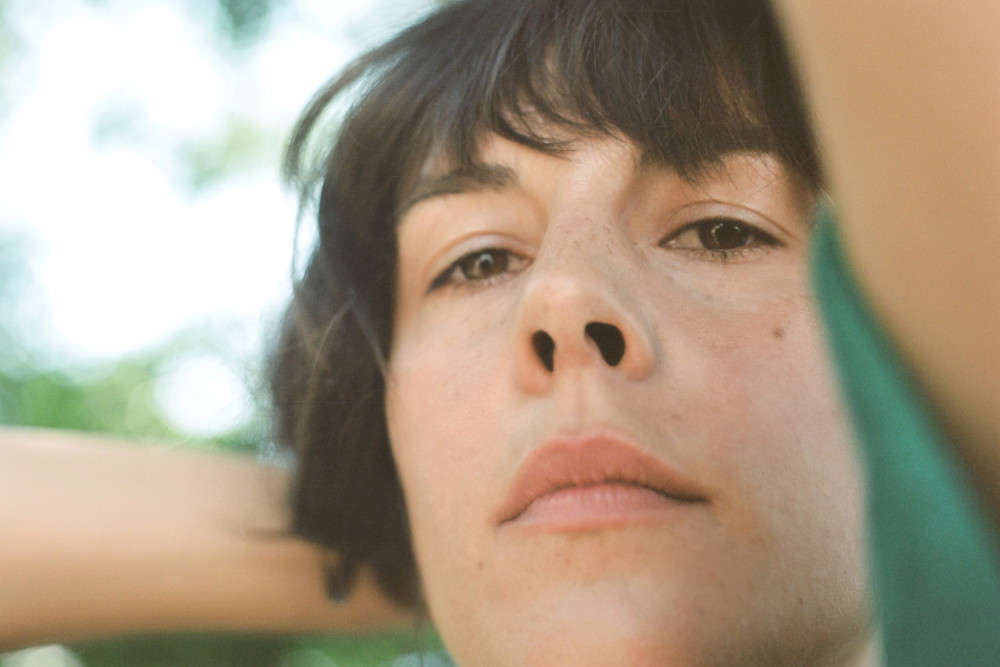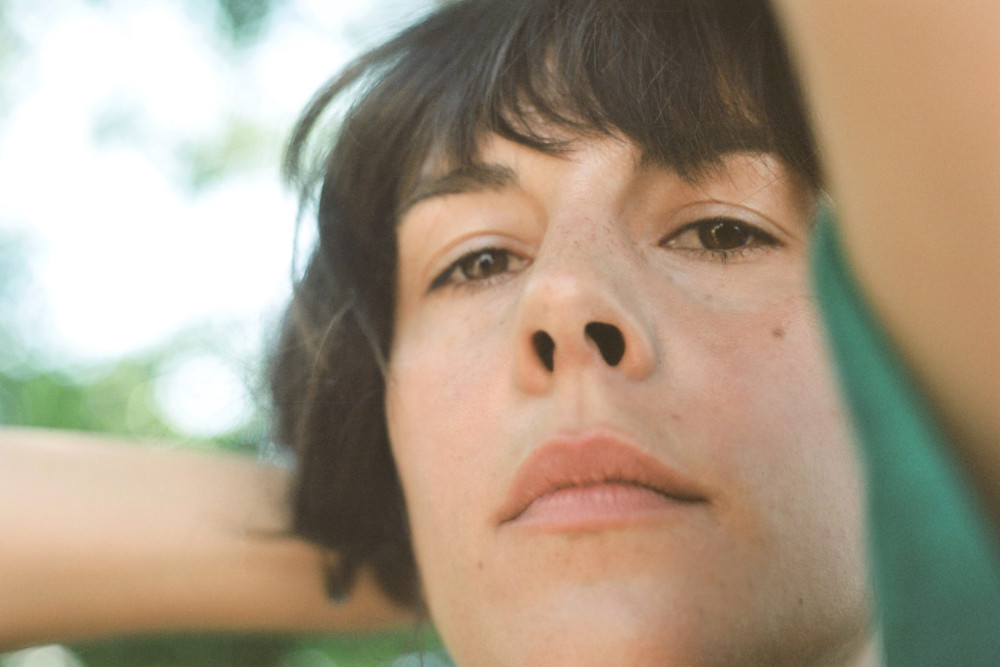

For Madi Diaz, the journey of History Of A Feeling has been a long one. She can hardly believe it herself. “2014…how is that simultaneously two seconds and like 5 million years ago?” she asks SPIN over Zoom from her Nashville home.
Diaz, who is perched on her red and white couch, glows as the sun pierces through the window behind her. It makes sense that she’s embraced such tranquility, considering she was “white-knuckling a Zen approach” to everything early on in the pandemic. “I didn’t have a publishing or label deal or any sort of foundation there at that point,” she recalls. “So it was tough, and it was scary, but it was also very strange the way that the cards started to just naturally fall.”
And they did. In February, the singer-songwriter signed to ANTI- Records. And seven years since her last full-length album, Phantom, Diaz shared her new LP, History Of A Feeling, on Aug. 27. The folk-pop album, anchored by honky-tonk guitar riffs and wistful lyrics, took shape gradually as Diaz went through her own healing process.
In 2017, Diaz endured a painful breakup. After the split, her partner came out as transgender. “When you’re in a super codependent relationship it’s weird [and it] hurts, and you don’t know how to untangle your feelings from their feelings,” she explains. Just a few months later, she relocated to Nashville for a fresh start, and what followed was a three-year process of compiling upwards of 150 songs. The result, History Of A Feeling, captures the heartbreak and growth Diaz experienced as she rebuilt her life. Whether it’s quiet rage (“I hope you fuck her with your eyes closed and think of me” on “Think of Me”) or the acceptance of a different future (“What used to work doesn’t work anymore” on “New Person, Old Place”), Diaz’s keen sense of self-awareness shines through each track.
Ahead of the LP’s release, Diaz spoke to SPIN about starting over in Nashville, having Kesha sing “Resentment” and still being known as a “new artist” 14 years into her career.
SPIN: When did you start making the record?
Madi Diaz: The first song that I officially wrote for the record was in a non-official sort of way. I wasn’t making the decision to start writing a record. I think as a writer, a creative person, it’s just the thing that I do to get through a day, or an experience, a feeling or a topic. I kind of have to chew on it, talk about it and figure out how to explain it to myself. The first song that ended up on the record dates back to fall of 2017 [in] October, but it was a long process that I wasn’t really aware of going through: just writing, existing and being, and growing day after day, which is kind of why there were 150 songs that were in the running. The accumulation of almost three years of writing and then getting to the point where it’s like, “Okay, now you get to do a thing. What are you going to do?”
Which artists were you inspired by for this record?
I was listening to a lot of Patty Griffin’s earliest record, Living With Ghosts, and Joni Mitchell’s Blue is a record that I go back to almost seasonally and ruminate on the rawness of having the opportunity. The label and ANTI- didn’t really enter the conversation until the record was finished, so I really was more giving myself the opportunity to make this body of work and was kind of lucky to just have a production partner in Andrew Sarlo just wanting to make something that sounded like me. But I guess I’ve been through so many different versions of myself that I was really wanting, deeply desiring, something as raw as those records are because they’ve stuck with me for so long. Lori McKenna is another one that I always go back to over and over again.
You put out your last full-length album, Phantom, in 2014 followed by your 2017 EP, Okay to Be Alone. What accounted for the large gap in time between albums?
Life was happening, and Phantom was such a push in a pop direction that at the end of the day it didn’t really resonate with who I am as a person and an artist. [I was] kind of all over the place, pouring my energy into different projects and writing. For better or worse, I definitely love being an escape artist and figuring out how to not sit still, but when I moved back to Nashville there’s so much less going on here. That really forced the issue of “How did you get here, and what’s going on with you?”
Was there ever a point in time that you weren’t sure if you were going to release another record?
100%. I mean, I can’t believe I’m still here. That’s kind of how a lot of this feels. I was sitting with my A&R from the label when I was in L.A. playing shows, and he was like, “As a new artist this, that and the other.” It’s just funny at 35 after having been doing this for 14 years to still carry the torch of the new artist. I also feel really lucky to have some sort of outlet to put these feelings.
What’s the meaning behind the title of your new record?
History Of A Feeling came from retracing my steps and trying to figure out certain patterns that I found myself in and walking it backwards and realizing that on some level, regardless of the thing that I’m going through, my reaction to that doesn’t even necessarily have to do with the thing that’s happening. It has to do with the narrative that I’ve been writing for my life because of that one thing that happened all the way back there.
What made you choose “Man in Me” as the lead single?
I wanted to lead with that one because I had been trying to find more of a production role with myself, especially before I found [writer and producer] Andrew Sarlo, and we started working together. In the spirit of not losing the plot, I wanted to make sure that the recording was as close to a mirror as possible of what I was going through and what I was feeling in the moment. So it felt like leading with that was the best way to rip off the Band-Aid.
“Resentment” is a beautiful song that Kesha also sang on The High Road. What’s the story behind it?
“Resentment” happened early on in the process of writing. It’s just this funny song that you don’t even realize that you’re writing sometimes in your relationship. It’s just all the times that you say, “I don’t need you to talk about that right now.” Or “This just isn’t a good time.” Or “I shouldn’t express this thing that I’m feeling.” It can be the silent third partner in a relationship and can creep up out of nowhere.
Your long-term relationship ended between records. Is this entire album about that relationship?
The relationship is — or was — definitely the catalyst for a lot of change in my life, but most endings inspire beginnings, if not all. So I think 15% of this record [is] a retelling of some stuff after the fact that had to do very closely with the relationship. Really, 85% of that record is what happens when you’re just sitting by yourself after the fact.
How did moving to Nashville help inspire you?
Nashville is just the best. In the groups that I’ve had the fortune to be with, I’m friends with everybody that I wrote my record with, and sometimes we’d get together and just talk and not even write a song. Just having the space and the time gives room to have really honest conversations and allows a really organic process to happen. In L.A., I felt like I was at the point where I was so tired and beat down there. It kind of put this pressure on things in a way that I didn’t really feel super centered in the end of it.
When you were alone and back in Nashville, what did you rediscover about yourself?
It started with lots of margaritas and nachos six days a week for three months. There was a hazy period of whatever and my sweet friends showing up at my house with flowers and bathrobes. I was really lucky, and I am really lucky, to be surrounded just by a fucking incredible community of kind humans that aren’t afraid to hold pain with you, even if they have nothing to say or nothing to add.
What was your process for healing from the relationship?
There is no magic cure, and there are no secret words — it just takes walking forward. I unearthed some resilience and some stuff about myself and what I used to look for and what was attractive to me back then that I think has changed now. When I got back to Nashville, I had to hit the ground. We’ve all hit the ground in relationships multiple times, I think. I’m 35 now. I had just gotten to the point where I was like, “I don’t want to hit the ground like that again, no matter what. I just want to make sure that whatever it is, I do it differently.” So that’s been my goal.
Between records, were you working on any other musical projects?
I found myself accidentally writing for film and TV. It never happens on purpose. I had the really wonderful luck of singing on Miranda Lambert’s last record, The Weight of These Wings, and that was just a really cool thing that happened. I was in a couple bands in L.A., more just fun projects. There’s an artist named Vérité who I’ve had the good fortune of just hanging out with her for months and writing for her project. I think coming back to Nashville, too, really solidified the fact that I feel so fortunate to have an artist career, and what I want more than anything else is “the song.”
What other artists have you written with or for between albums?
A couple of songs that are coming haven’t come out yet. They’re pretty secretive about releasing stuff, so I wish I could say, but I can’t. But the other one that just accidentally happened was the Kesha cut “Resentment,” on her last record, The High Road. I had never, ever thought that I would hear Kesha singing one of my songs because she was our “pump up” music in our mid-twenties when Saturday night and Tuesday night were still interchangeable, because that’s your zone. But the fact that she’s singing that song as a duet with Sturgill Simpson and then Brian freaking Wilson? It is so wild to me.
Have you thought about what the next record would look like for you? Have you been writing at all?
I definitely have the skeletal blueprint of the next thing in the can. That’s the funny thing about something taking four years. All of us had plenty of time on our hands in 2020, so I doubled down and went even further down the rabbit hole. It feels good to move on.


Leave a comment